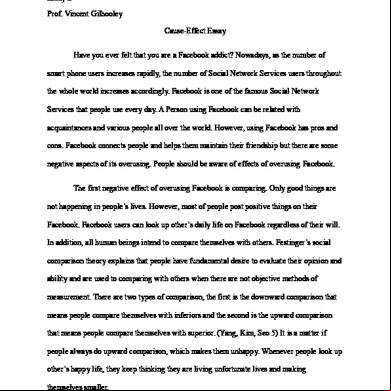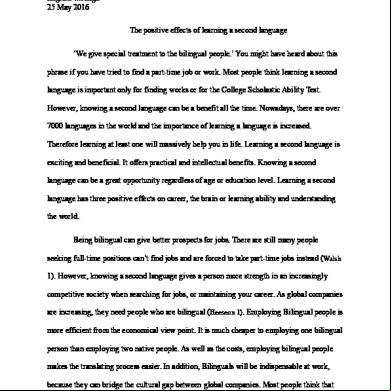Cause Effect Essay 316x4i
This document was ed by and they confirmed that they have the permission to share it. If you are author or own the copyright of this book, please report to us by using this report form. Report 2z6p3t
Overview 5o1f4z
& View Cause Effect Essay as PDF for free.
More details 6z3438
- Words: 994
- Pages: 4
[텍스트 입력]
[텍스트 입력]
Song 1
Song JungIn Vincent Gilhooley English writing2 25 May 2016 The positive effects of learning a second language ‘We give special treatment to the bilingual people.’ You might have heard about this phrase if you have tried to find a part-time job or work. Most people think learning a second language is important only for finding works or for the College Scholastic Ability Test. However, knowing a second language can be a benefit all the time. Nowadays, there are over 7000 languages in the world and the importance of learning a language is increased. Therefore learning at least one will massively help you in life. Learning a second language is exciting and beneficial. It offers practical and intellectual benefits. Knowing a second language can be a great opportunity regardless of age or education level. Learning a second language has three positive effects on career, the brain or learning ability and understanding the world. Being bilingual can give better prospects for jobs. There are still many people seeking full-time positions can’t find jobs and are forced to take part-time jobs instead (Walsh 1). However, knowing a second language gives a person more strength in an increasingly competitive society when searching for jobs, or maintaining your career. As global companies are increasing, they need people who are bilingual (Heeseon 1). Employing Bilingual people is more efficient from the economical view point. It is much cheaper to employing one bilingual person than employing two native people. As well as the costs, employing bilingual people makes the translating process easier. In addition, Bilinguals will be indispensable at work, because they can bridge the cultural gap between global companies. Most people think that Korean companies don’t need any bilingual people. However, there are many companies that
[텍스트 입력]
[텍스트 입력]
Song 2
give preferences to bilingual people, even though they are not global companies but Korean companies. Regarding the marketing, companies need bilingual people who know the foreigners’ taste and demand. Bilingual people know not only the language but also the foreign culture. Learning a second language has great effects on the brain and ability of learning languages. Being bilingual improves your hearing and helps with attention span and working memory. A second language makes learning a third or fourth language easier because people have already learned one and memorized how to learn a new language easily. Learning a second language also significantly delayed the onset of many brain related diseases such as Alzheimer and dementia, compared to those who can only speak their native tongue (Bak 1). This mental health advantage even extended to people who were illiterate, meaning that simply knowing how to speak two languages is beneficial even if you can’t read. In addition, most people have better understanding of their first language, because they can compare grammatical structure between the two. By comparing two languages, people can find differences and similarities. Knowing multiple languages also forces your brain to pay attention to relevant sounds, while blocking out irrelevant sounds (Leopold 1). As a result, their language learning ability can be improved more than learning only a native language. Furthermore, Bilingualism improves decision making. People who routinely make decisions in a foreign language rather than their native tongue might be less biased in their savings, investment, and retirement decisions. People can understand the world and experience new cultures through learning a new language. Learning a new language gives you a greater global understanding of the world. People will be able have more experiences as they can communicate effectively with much more people. Since a language is a doorway to a particular culture, learning a new language
[텍스트 입력]
[텍스트 입력]
Song 3
enables a person to have a broader understanding of that race or culture (Smith 1). Opening up to a culture allows you to be more flexible and appreciative of other ways of doing and looking at things. As a result, bilinguals will become open-minded and view things with different perspectives regarding the new culture of the world. Different culture have their own music, style, history, literature and many more interesting aspects which people will be able to enjoy and understand. This means that there are many chances to meet different world’s literature. Bilingual people can connect through books and TV, ultimately broadening their horizons and interests. Therefore, the chances to broadening their view can be increased. Overall there can be no denying that learning languages is wholly positive for individuals and society and that it is highly important to know more than one language. Learning a second language has great effects on a person. It can be beneficial to people regardless of the education level or age. Foreign languages are becoming a basic subject alongside English and Math as they already are in the countries. Most Korean students think that learning a second language is not vital because it has little relevance with the College Scholastic
Ability Test. Although learning a second language doesn’t help in the present, it will help in the future. As a result, it is important to know the positive effects of learning a second language.
Knowing a second language can be a help to every time. Being bilingual as soon as possible is good to everyone.
[텍스트 입력]
[텍스트 입력]
Song 4
Works cited 1) Walsh, Ben. "The Job Market Is Still Hurting, In 2 Charts." The Huffington Business. The Huffington Post, 6 Mar. 2015. Web. 25 May 2016. 2) Heeseon, Kim. "There Are Many Companies Which Need the People Who Are Bilingual." Union News. NAVER News, 29 Sept. 2005. Web. 25 May 2016. 3) Bak, Thomas. "Speaking a Second Language May Delay Dementia." BBC News. BBC News, 7 Nov. 2013. Web. 24 May 2016. 4) Leopold, Wendy. “Bilingualism Fine-Tunes Hearing, Enhances Attention”: Northwestern University News. Northwestern News, 30 Apr. 2012. Web. 24 May 2016. 5) Smith, Jennifer. "The Benefits of Learning a Second Language." Omniglot. Omniglot, 22 Oct. 2014. Web. 24 May 2016.
[텍스트 입력]
Song 1
Song JungIn Vincent Gilhooley English writing2 25 May 2016 The positive effects of learning a second language ‘We give special treatment to the bilingual people.’ You might have heard about this phrase if you have tried to find a part-time job or work. Most people think learning a second language is important only for finding works or for the College Scholastic Ability Test. However, knowing a second language can be a benefit all the time. Nowadays, there are over 7000 languages in the world and the importance of learning a language is increased. Therefore learning at least one will massively help you in life. Learning a second language is exciting and beneficial. It offers practical and intellectual benefits. Knowing a second language can be a great opportunity regardless of age or education level. Learning a second language has three positive effects on career, the brain or learning ability and understanding the world. Being bilingual can give better prospects for jobs. There are still many people seeking full-time positions can’t find jobs and are forced to take part-time jobs instead (Walsh 1). However, knowing a second language gives a person more strength in an increasingly competitive society when searching for jobs, or maintaining your career. As global companies are increasing, they need people who are bilingual (Heeseon 1). Employing Bilingual people is more efficient from the economical view point. It is much cheaper to employing one bilingual person than employing two native people. As well as the costs, employing bilingual people makes the translating process easier. In addition, Bilinguals will be indispensable at work, because they can bridge the cultural gap between global companies. Most people think that Korean companies don’t need any bilingual people. However, there are many companies that
[텍스트 입력]
[텍스트 입력]
Song 2
give preferences to bilingual people, even though they are not global companies but Korean companies. Regarding the marketing, companies need bilingual people who know the foreigners’ taste and demand. Bilingual people know not only the language but also the foreign culture. Learning a second language has great effects on the brain and ability of learning languages. Being bilingual improves your hearing and helps with attention span and working memory. A second language makes learning a third or fourth language easier because people have already learned one and memorized how to learn a new language easily. Learning a second language also significantly delayed the onset of many brain related diseases such as Alzheimer and dementia, compared to those who can only speak their native tongue (Bak 1). This mental health advantage even extended to people who were illiterate, meaning that simply knowing how to speak two languages is beneficial even if you can’t read. In addition, most people have better understanding of their first language, because they can compare grammatical structure between the two. By comparing two languages, people can find differences and similarities. Knowing multiple languages also forces your brain to pay attention to relevant sounds, while blocking out irrelevant sounds (Leopold 1). As a result, their language learning ability can be improved more than learning only a native language. Furthermore, Bilingualism improves decision making. People who routinely make decisions in a foreign language rather than their native tongue might be less biased in their savings, investment, and retirement decisions. People can understand the world and experience new cultures through learning a new language. Learning a new language gives you a greater global understanding of the world. People will be able have more experiences as they can communicate effectively with much more people. Since a language is a doorway to a particular culture, learning a new language
[텍스트 입력]
[텍스트 입력]
Song 3
enables a person to have a broader understanding of that race or culture (Smith 1). Opening up to a culture allows you to be more flexible and appreciative of other ways of doing and looking at things. As a result, bilinguals will become open-minded and view things with different perspectives regarding the new culture of the world. Different culture have their own music, style, history, literature and many more interesting aspects which people will be able to enjoy and understand. This means that there are many chances to meet different world’s literature. Bilingual people can connect through books and TV, ultimately broadening their horizons and interests. Therefore, the chances to broadening their view can be increased. Overall there can be no denying that learning languages is wholly positive for individuals and society and that it is highly important to know more than one language. Learning a second language has great effects on a person. It can be beneficial to people regardless of the education level or age. Foreign languages are becoming a basic subject alongside English and Math as they already are in the countries. Most Korean students think that learning a second language is not vital because it has little relevance with the College Scholastic
Ability Test. Although learning a second language doesn’t help in the present, it will help in the future. As a result, it is important to know the positive effects of learning a second language.
Knowing a second language can be a help to every time. Being bilingual as soon as possible is good to everyone.
[텍스트 입력]
[텍스트 입력]
Song 4
Works cited 1) Walsh, Ben. "The Job Market Is Still Hurting, In 2 Charts." The Huffington Business. The Huffington Post, 6 Mar. 2015. Web. 25 May 2016. 2) Heeseon, Kim. "There Are Many Companies Which Need the People Who Are Bilingual." Union News. NAVER News, 29 Sept. 2005. Web. 25 May 2016. 3) Bak, Thomas. "Speaking a Second Language May Delay Dementia." BBC News. BBC News, 7 Nov. 2013. Web. 24 May 2016. 4) Leopold, Wendy. “Bilingualism Fine-Tunes Hearing, Enhances Attention”: Northwestern University News. Northwestern News, 30 Apr. 2012. Web. 24 May 2016. 5) Smith, Jennifer. "The Benefits of Learning a Second Language." Omniglot. Omniglot, 22 Oct. 2014. Web. 24 May 2016.





